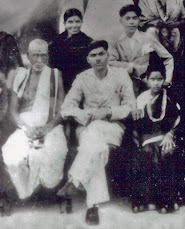One common cause for mental conflict is the necessity for making decisions. Every moment of our existence faces us with the question - to do a thing or not to do it, to say 'yes' or to say 'no'.
Some persons are blessed with a constitution or early training or both which leaves them with absolute certainty as to what to do and say. They are in no conflict and even apparent emergencies do not ruffle them. There are others whose mind is troubled by constant doubts. In all cases the guide to action is based on signals which indicate yes or no; green or red; right, wrong. Those who act with great speed and firmness, may be those who know their signals thoroughly or those who do not care for signals at all. The former are the leaders and the latter are the reckless criminals or occasional heroes. The rest broadly fall into the category of those who have never properly learnt the signals on the road of life or those with weak eyesight or foggy glasses who cannot quickly distinguish between the traffic lights and move their cars and disturb themselves and others.
One of the major tasks of a civilised society is the induction of a sound signalling system in its citizens. If some small percentage of the thought, care and effort put into the management of the traffic of our modern cities is put into the inner traffic of a man's mind there would be less of catastrophes at the personal, national and international levels. This is to emphasise the need for cultivating a reliable signal system for action as an essential need for orderly development of mental health.
One example of this concept of signals may be considered here. Most of us base our actions on judgements and assessment about future possibilities. Immediate signals are usually ignored. For instance, a man has some ready money in hand. There is a loan from a friend which he has to repay. There is also a piece of land available cheaply and which might double the income in a year's time. One man repays the loan because that is the right thing to do here and now. He ensures happiness for himself and his friend. Another man acts on possible future and with a lame excuse but good intention defers the loan and buys the land. In a few months litigation starts and not only is his income not doubled but he may have to take fresh loans. He caused unhappiness to his friend and misery to himself. He is in the position of the man who ignores the red traffic signal in front and acts on the possibility of a green signal at the next turning.
Most of us cause mental and physical damage to ourselves by acting with a future mirage as our guide to action. If we analyse ourselves carefully we will find that this tendency, miscalled planning, lies at the root of all troubles. If we analyse the great leaders of men, we will be struck by the tenacity and clarity with which they did the right thing here and now even if it apparently meant to the onlookers as foolish from a long term point of view. What such people build lasts. One of Tolstoy's stories about the right time, the right person and the right thing to do succinctly illustrates this point.
He concluded that the right time is NOW, the right person is the one in FRONT and the right thing to do is to do GOOD.
Next time if you are in doubt as to what is to be done you better ask yourself what in all your conscience is the right thing to do here and now and not how well it fits with your schemes poetically called plans. Remember the traffic lights are for here and now and you will reach the goal. At least you will sleep in peace.
Some persons are blessed with a constitution or early training or both which leaves them with absolute certainty as to what to do and say. They are in no conflict and even apparent emergencies do not ruffle them. There are others whose mind is troubled by constant doubts. In all cases the guide to action is based on signals which indicate yes or no; green or red; right, wrong. Those who act with great speed and firmness, may be those who know their signals thoroughly or those who do not care for signals at all. The former are the leaders and the latter are the reckless criminals or occasional heroes. The rest broadly fall into the category of those who have never properly learnt the signals on the road of life or those with weak eyesight or foggy glasses who cannot quickly distinguish between the traffic lights and move their cars and disturb themselves and others.
One of the major tasks of a civilised society is the induction of a sound signalling system in its citizens. If some small percentage of the thought, care and effort put into the management of the traffic of our modern cities is put into the inner traffic of a man's mind there would be less of catastrophes at the personal, national and international levels. This is to emphasise the need for cultivating a reliable signal system for action as an essential need for orderly development of mental health.
One example of this concept of signals may be considered here. Most of us base our actions on judgements and assessment about future possibilities. Immediate signals are usually ignored. For instance, a man has some ready money in hand. There is a loan from a friend which he has to repay. There is also a piece of land available cheaply and which might double the income in a year's time. One man repays the loan because that is the right thing to do here and now. He ensures happiness for himself and his friend. Another man acts on possible future and with a lame excuse but good intention defers the loan and buys the land. In a few months litigation starts and not only is his income not doubled but he may have to take fresh loans. He caused unhappiness to his friend and misery to himself. He is in the position of the man who ignores the red traffic signal in front and acts on the possibility of a green signal at the next turning.
Most of us cause mental and physical damage to ourselves by acting with a future mirage as our guide to action. If we analyse ourselves carefully we will find that this tendency, miscalled planning, lies at the root of all troubles. If we analyse the great leaders of men, we will be struck by the tenacity and clarity with which they did the right thing here and now even if it apparently meant to the onlookers as foolish from a long term point of view. What such people build lasts. One of Tolstoy's stories about the right time, the right person and the right thing to do succinctly illustrates this point.
 |
| By Michael Sevier (illustrator) [Public domain], via Wikimedia Commons |
Next time if you are in doubt as to what is to be done you better ask yourself what in all your conscience is the right thing to do here and now and not how well it fits with your schemes poetically called plans. Remember the traffic lights are for here and now and you will reach the goal. At least you will sleep in peace.











